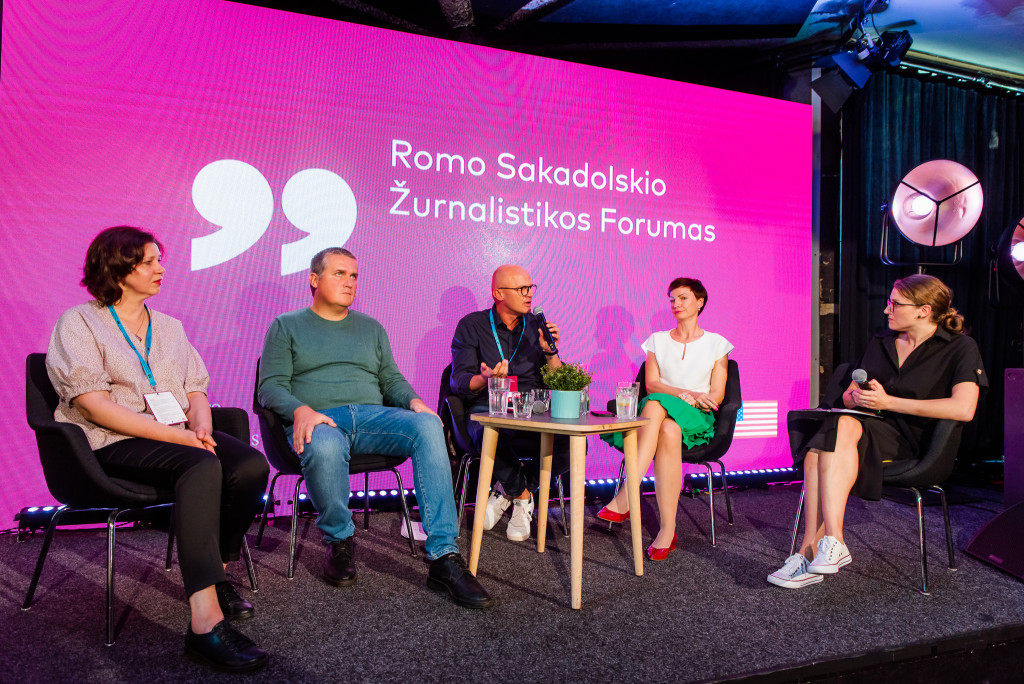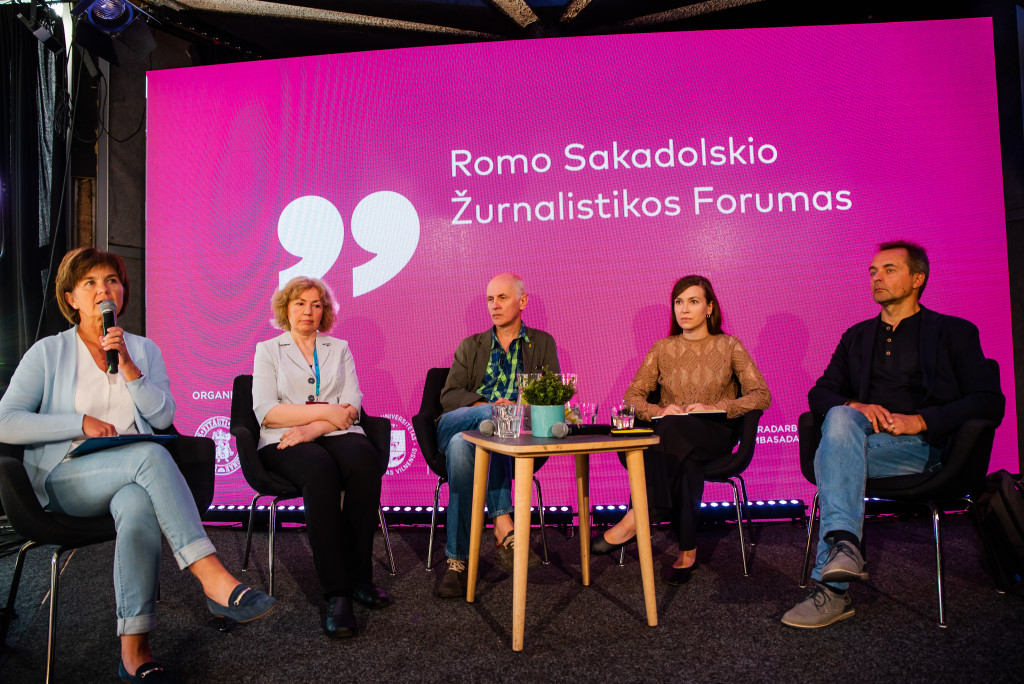 Back
Back

Lithuanian and foreign journalism experts and academics debated the condition and difficulties of journalism in Lithuania on September 22nd, during the international academic Romas Sakadolskis Journalism Forum, which was held in Vilnius for the third year in a row.
The role of the media in the face of threats and polarization
According to the professor Ainė Ramonaitė, the media can either incite polarization of society or reduce it. She emphasized that the conspiracy theories from the United States are coming to us as well, that‘s why american events cannot be ignored.
Another problem, according to A. Ramonaitė is that some journalists are also influencers. “It should be separated, because people cannot understand when a person speaks as a journalist and when as an influencer” said A. Ramonaitė.
Journalism – power or duty?
According to LRT general director Monika Garbačiauskaitė-Budrienė, the media is losing its status as the fourth estate, and it is caused by several conditions. “First of all, a divided, fragmented society, the rise of social networks and the attitude of the media itself – it should turn to higher standards. The media has power, but it’s not as powerful as it used to be” M. Garbačiauskaitė-Budrienė said.
At the same time, the Inspector of Journalist Ethics Gražina Ramanauskaitė expressed a different opinion. “I really do not agree with the statement that the power of the media is diminishing. Perhaps the number of traditional media users has decreased because they have been lured by social networks. But our national characteristics are such that the media has unlimited power, it dictates the political agenda, it changes it. The role of the “watchdog” is very strong in Lithuania. Our traditional media, professional journalists have made tremendous progress. We have to be proud and happy about it” said G. Ramanauskaitė.
“We are debating who has more power, the media or the influencers. I say that the most powerful thing is the story, no matter what the source is. We don’t compete in forms (television, news portal, social network), but in content – which content attracts people more”, said vlogger Skirmantas Malinauskas.
According to journalist Edmundas Jakilaitis, media content must have an impact and it does. “One of the goals of the media is to have an impact, to change society by informing it” said the journalist, adding that the biggest threat he sees is society’s segmentation.
“We have a society that lives in its own bubbles and blindly believes in something. We are becoming a society that lacks critical thinking. I would really like people to read the works of several journalists, not just one, and evaluate them critically” said E. Jakilaitis.
“It is very important that the source of information would be reliable and that citizens would get information from reliable sources and not from obscure Facebook groups or YouTube channels. Both civil society and responsible institutions should be more responsive to channels that are engaged in disseminating disinformation” M. Garbačiauskaitė-Budrienė said.

How should journalists be represented?
Birutė Davidonytė, a representative of investigative journalism named the lack of access to information as the main challenge and biggest problem for journalists.
Dainius Radzevičius, the chairman of the Lithuanian Journalists Union drew attention to the journalists sluggishly joining the unions. According to him, journalists unite only in critical cases, mostly ethical ones.
In B. Davidonytė’s opinion, it is not necessary for journalists to be united on all issues, but in order to be heard, it is necessary to represent the organization – i.e. talk together.
The future of journalism
Academician Ignas Kalpokas, looking at the future of journalism, said that artificial intelligence will be able to generate an even greater amount of content, create a real influx of it, which we will hardly be able to cope with.
The report “Traversing the Future of Journalism in a Convergent Media Landscape” was presented and the future of journalism was reviewed by a guest from the USA – former CNN producer, Howard University Assoc. Jennifer C. Thomas.
Journalist or critic?
According to cultural journalist Jolanta Kryževičienė, moderator of the discussion “Is a critic a journalist and how much criticism is needed in journalism?”, professional critics are accused of closing themselves in a narrow circle and not reaching their audience, while journalists are accused of going into areas they should not go into.
“Every field of criticism needs depth, and journalism needs breadth. However, critical thinking, ethics, and information reliability are equally important to both – i.e. checking information, explaining it, going deeper and presenting such checked information to the public” said musicologist Laimutė Ligeikaitė.
Cultural journalist Jogintė Bučinskaitė raised the question, does it matter who writes criticism – a journalist or a critic? “The most important thing is that the criticism is good. But there is too much of it, so we don’t have time to consume and distinguish what is good criticism and what is not”.

Media or mass media?
“The media is a medium, an intermediary. Mass media is an institution that productively produces news. If I am the media, I try to make the exchange go smoothly, and if I am the mass media, I buy content from the content producer or tell them what to produce. I buy and sell what I think is the best. Media is a business and any business takes into account the needs of its market or thinks about what the market might need and shapes it” Aleksandras Algirdas Abišala, signatory of the Act of Independence of Lithuania, defined the differences between media and mass media.
The event was organizes by Vytautas Magnus University and Vilnius University, in cooperation with the United States Embassy in Lithuania.
The author of the text is Kristina Berksun, photo by Jonas Petronis (Vytautas Magnus university).